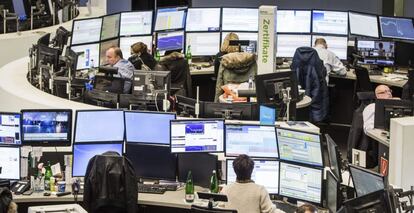Spanish markets face slowdown threat with no government in sight
Ibex 35 showing same volatility as other bourses after Monday’s heavy losses

Ongoing uncertainty about Spain’s political future is doing additional damage to the Spanish stock market, which is already under the same kind of duress as other European bourses because of concerns about a global slowdown.
With inconclusive elections held on December 20 and no functioning executive in sight yet, “the uncertainty surrounding the formation of a government” is the greatest risk to the Spanish economy, according to the European Commission.
Investors fear a new global slowdown caused by the Great Recession, whose effects are now focused on the emerging nations
But for now, analysts and economists agree that global problems are weighing more heavily than domestic ones on the Spanish markets.
Still, the blue-chip Ibex 35 ended 2015 with the worst performance in Europe, losing 7.1% of its value. And so far in 2016, it has yielded nearly 15%, although other exchanges in the continent have not fared much better.
Market volatility
February seems set to go the same way. After heavy falls on Monday, European stock markets opened Tuesday morning to a somewhat smoother start. But just a half-hour into the session, all the continent’s main bourses were already in the red again.
The Spanish Ibex 35 fell over 1% in a trend shared by other indexes in Europe. Italy fared the worst, giving up 2.8%. However, an hour into the session, the Ibex 35 advanced 0.3%, in line with other major European markets.
The risk premium – the extra yield investors demand to hold Spanish 10-year bonds rather than similar maturity German ones – also saw volatility, shooting up before 8am but later returning to Monday’s level of around 153 basis points.
The ups and downs on Tuesday morning came a day after European markets posted huge losses, with the Spanish exchange yielding 4.4% and the Italian one falling by nearly 4.7%.
For now, analysts and economists agree that global problems are weighing more heavily than domestic ones on the Spanish markets
Investors fear a new global slowdown caused by the Great Recession, whose effects are now focused on the emerging nations. They also harbor doubts about the real state of the European banking sector.
But so far, the country’s economic indicators show no signs of skittishness. Economy Minister Luis de Guindos said last week that political uncertainty was “not ideal for the economy” but underscored that it had not yet had an impact.
Asked about alleged pressure from Ibex sources to have the acting government of the Popular Party (PP) step aside in favor of an alliance between the Socialists and Ciudadanos, PP spokesman Pablo Casado said no businessperson, either from the Ibex or outside it, has been in touch with acting prime minister Mariano Rajoy to ask for anything.
“We do feel that the best thing that can happen to businesses is for the PP to stay in power,” added Casado.
English version by Susana Urra.
Tu suscripción se está usando en otro dispositivo
¿Quieres añadir otro usuario a tu suscripción?
Si continúas leyendo en este dispositivo, no se podrá leer en el otro.
FlechaTu suscripción se está usando en otro dispositivo y solo puedes acceder a EL PAÍS desde un dispositivo a la vez.
Si quieres compartir tu cuenta, cambia tu suscripción a la modalidad Premium, así podrás añadir otro usuario. Cada uno accederá con su propia cuenta de email, lo que os permitirá personalizar vuestra experiencia en EL PAÍS.
En el caso de no saber quién está usando tu cuenta, te recomendamos cambiar tu contraseña aquí.
Si decides continuar compartiendo tu cuenta, este mensaje se mostrará en tu dispositivo y en el de la otra persona que está usando tu cuenta de forma indefinida, afectando a tu experiencia de lectura. Puedes consultar aquí los términos y condiciones de la suscripción digital.








































